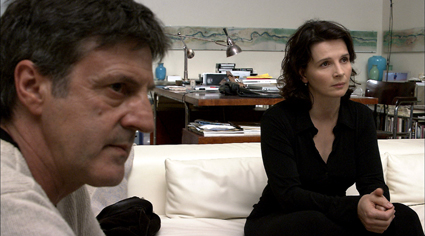

Reviews of Recent Independent, Foreign, & Documentary Films in Theaters and DVD/Home Video
Directed & Written by: Michael Haneke. Produced by: Veit Heiduschka & Margaret Menegoz. Director of Photography: Christian Berger. Edited by: Michael Hudecek & Nadine Muse. Released by: Sony Pictures Classics. Language: French with English subtitles. Country of Origin: France/Austria/Germany/Italy. 117 min. Rated: R. With: Daniel Auteuil, Juliette Binoche, Maurice Bénichou, Annie Girardot & Lester Makedonsky.
Someone has been sending anonymous videotapes to Georges Laurent and his
wife Anne (Daniel Auteuil and Juliette Binoche). The first is an unedited
two-hour recording of the front of their Paris townhouse, followed by a
crayon drawing of a child with bright red blood spurting out of its mouth.
When the alarmed couple go to the police, they are told they cannot
intercede without evidence of physical harm or an explicit threat. The next
tape becomes more personal: it's of Georges' childhood country home. Sorting
out the cryptic clues from yet another video leads Georges to the rundown
apartment of Majid (Maurice Bénichou), the son of the Algerian farmhands who had worked for his
parents - the first time the two had spoken to each other in 40 years. Majid
gently denies any involvement in making or sending the tapes. Disbelieving
him, Georges threatens, "Terrorize me and my family and you'll regret it,"
calling to mind a certain big-stick foreign policy. Even this
conversation is videotaped and later sent to Georges. Director Michael
Haneke keeps up the ominous tone throughout, as the camera follows Georges
and Anne's 12-year-old son at swim practice or in one tense elevator ride
with Georges and an unwelcome visitor.
This being a series of long, static wide shots of seemingly everyday
occurrences, it is not always clear whether a shot is the director's point
of view or from the surveillance camera. (The entire film was shot on
digital video.) The uncertainty gives an edge to the monotony and to what
otherwise seems detached and impersonal. Though by the end, it will be
apparent that Haneke has orchestrated every shot, purposely selecting what
details to include, and importantly, to exclude.
Adding to the muted impact is the guarded and angry Georges. Woe to any actor cast opposite
Binoche; her
vulnerability steals the focus and makes her much more sympathetic when her
eyes - in a flash - well up with tears. After Bee Season's Richard
Gere, Daniel Auteuil is the second leading man this year to be diminished
under her spell.
With minimal editing and no musical score, this is indirectly a thriller,
where the past, in this case France's colonial history, haunts Georges and
Anne. (Majid's parents were killed by French police during a political
protest.) There are also a few brief inserts of an Algerian boy roaming in
their home like a ghost, emphasizing this point, but this critique lacks
bite and focus. Georges was after all only a child when Majid became
orphaned; how much responsibility should a spoiled six-year-old have for
Majid's fate? What exactly young Georges did isn't specific, and Georges'
feelings of guilt, like the videotapes themselves, are enigmatic. If Haneke's
The Piano Teacher featured a riveting, but overwritten central
character, his lean script for Caché (Hidden) moves in the opposite
direction. Kent Turner
|